新标准英语第二册Module3_Unit2__I_don't_like_riding_my_bike
《新课标英语》三年级起第二册Module3 Unit2 《I don’t like riding bikes .》教案和教学反思
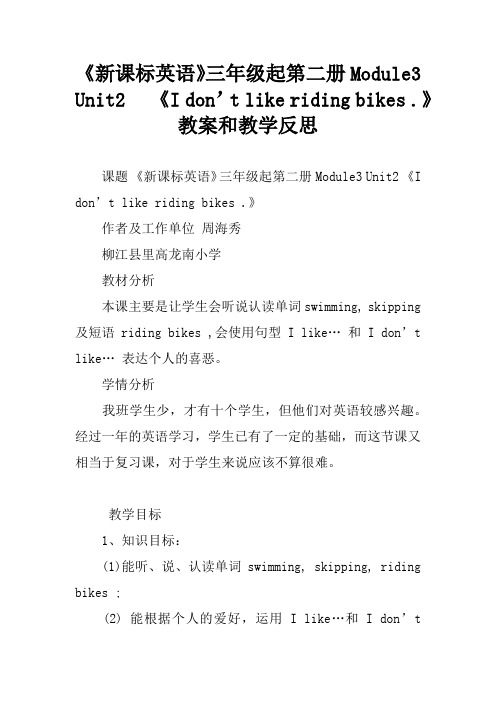
《新课标英语》三年级起第二册Module3 Unit2 《I don’t like ridingbikes .》教案和教学反思课题《新课标英语》三年级起第二册Module3 Unit2 《I don’t like riding bikes .》作者及工作单位周海秀柳江县里高龙南小学教材分析本课主要是让学生会听说认读单词swimming, skipping及短语riding bikes ,会使用句型I like…和 I don’t like…表达个人的喜恶。
学情分析我班学生少,才有十个学生,但他们对英语较感兴趣。
经过一年的英语学习,学生已有了一定的基础,而这节课又相当于复习课,对于学生来说应该不算很难。
教学目标1、知识目标:(1)能听、说、认读单词swimming, skipping, riding bikes ;(2) 能根据个人的爱好,运用I like…和I don’tlike…来表达自己喜欢和不喜欢的体育运动。
2、能力目标:培养学生在情境中熟练运用句型,灵活运用交际用语的能力。
3、情感目标:通过有趣的课堂活动,激发学生的兴趣,鼓励学生大胆开口说英语。
教学重点和难点1、教学重点:单词swimming, skipping, riding bikes 的认读。
2、教学难点:能根据个人的爱好,运用I like…和I don’t like…来表达自己喜欢和不喜欢的体育运动。
教学过程一、Warm-up1. Greeting.2. Sing a song 把课文第四部分chant编成歌曲,师生齐唱。
二、Presentation and practice1.Learn the new wards(1)复习football, basketball, table tennis, morning exercises.(2)用PPT展示并教学认读swimming, skipping, riding bikes.(3)巩固单词:把体育运动项目编成chant,游戏What’s missing?2.practice the sentences pattern(1)练习句型“I like…”1)老师引出句型“ I like…”并把卡片贴黑板上。
Module 3 Unit2 I don’t like riding my bikes 教案
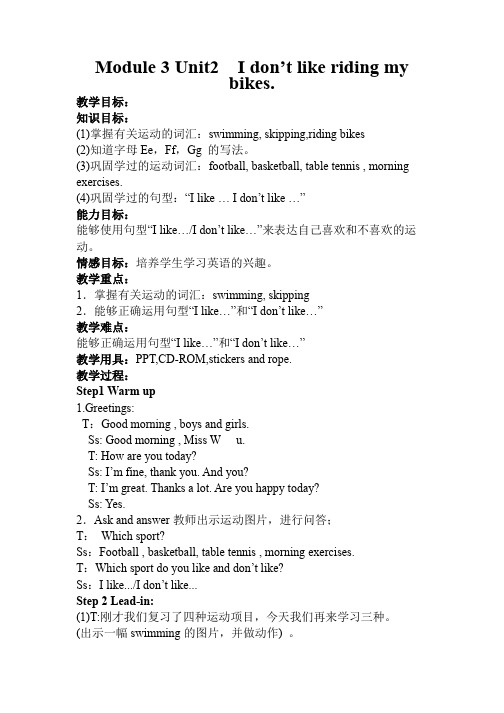
Module 3 Unit2 I don’t like riding mybikes.教学目标:知识目标:(1)掌握有关运动的词汇:swimming, skipping,riding bikes(2)知道字母Ee,Ff,Gg 的写法。
(3)巩固学过的运动词汇:football, basketball, table tennis , morning exercises.(4)巩固学过的句型:“I like … I don’t like …”能力目标:能够使用句型“I like…/I don’t like…”来表达自己喜欢和不喜欢的运动。
情感目标:培养学生学习英语的兴趣。
教学重点:1.掌握有关运动的词汇:swimming, skipping2.能够正确运用句型“I like…”和“I don’t like…”教学难点:能够正确运用句型“I like…”和“I don’t like…”教学用具:PPT,CD-ROM,stickers and rope.教学过程:Step1 Warm up1.Greetings:T:Good morning , boys and girls.Ss: Good morning , Miss W u.T: How are you today?Ss: I’m fine, thank you. And you?T: I’m great. Thanks a lot. Are you happy today?Ss: Yes.2.Ask and answer教师出示运动图片,进行问答;T:Which sport?Ss:Football , basketball, table tennis , morning exercises.T:Which sport do you like and don’t like?Ss:I like.../I don’t like...Step 2 Lead-in:(1)T:刚才我们复习了四种运动项目,今天我们再来学习三种。
外研版小学英语三年级第二册Module3Unit2教材内容全解
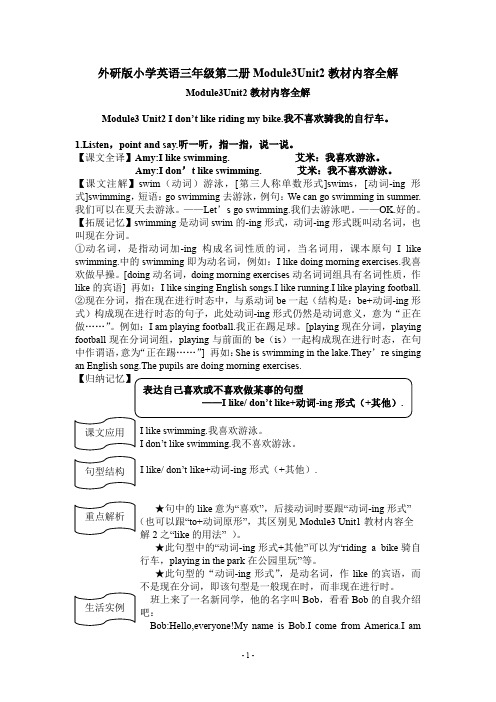
an English song.The pupils are doing morning exercises. 【归纳记忆】
表达自己喜欢或不喜欢做某事的句型
——I like/ don’t like+动词-ing 形式(+其他).
课文应用 I like swimming.我喜欢游泳。 I don’t like swimming.我不喜欢游泳。
左下图:I like morning exercises.
中上图:I don’t like basketball.
中下图:I like table tennis.
右上图:I like riding my bike.
右下图:I don’t like swimming.
4.Listen and say.Then chant.听一听,说一说,然后说唱。
艾米:我喜欢游泳。
Amy:I don’t like swimming.
艾米:我不喜欢游泳。
【课文注解】swim(动词)游泳,[第三人称单数形式]swims,[动词-ing 形
式]swimming,短语:go swimming 去游泳,例句:We can go swimming in summer.
我们可以在夏天去游泳。——Let’s go swimming.我们去游泳吧。——OK.好的。
注意:1)只有动词才有动词-ing 形式;
2)还有几种不常见变化规则,以后再了解。
2.Listen and say.听一听,说一说。
【课文全译】I like swimming.
我喜欢游泳。
I don’t like skipping.
我不喜欢跳绳。
I like skipping.
外研社新标准英语三年级第二册《I like football》教案

一、学科:英语二、课例名称:新标准英语第二册第三模块第一单元I like football.五、课型:新授课六、年级:三年级七、教材版本:外研社新标准英语三年级第二册八、教学设计:1. 教材地位及内容分析本课选自新标准英语第二册第三模块Module 3 Playground Unit 1 I like football. 内容以体育运动为基本素材,使用I like...;I don’t like...来谈论自己的喜好。
题材贴近学生生活实际,学生较感兴趣。
2. 教学目标1)语言知识目标:使学生能够熟练地使用本课语言项目,即:I like...;I don’t like….能听、说、认读单词:football, basketball, table tennis, like, morning exercises。
2)能力发展目标:培养学生用英语进行口头交际的能力,提高听、说、读的能力。
3)情感态度目标:激发学生的兴趣,使他们有兴趣听英语、说英语、用英语做游戏;培养学生积极向上,热爱生活的情感。
3. 教学重点:能听懂会说I like…. I don’t like….4. 教学难点:1) morning exercises的读音;2)将本课的知识运用到真实的情境中。
5. 教具准备:磁带、单词卡片、实物(篮球、足球、乒乓球)、贴纸、多媒体等。
6. 学生和内容分析:本节课的是三年纪下册的内容,但录制节目的时间是在上学期开学不久,所以学生的英语水平非常有限,因此这节课我采用了多种手段辅助教学。
本课谈论的是运动项目,整堂课的各个环节都可以用动作来贯穿教学。
边说边做动作;做动作猜运动项目;通过动作理解单词等。
充分体现了玩中学,学中玩。
7. 课时安排:一课时8. 教学程序Step1. Warming up.1) Greetings2) Free talk.3) Sing a song (Good morning )(设计意图:欢快的歌曲演唱充分调动了全班同学的学习积极性,缓解了学生的紧张情绪。
外研版三年级英语《Module3-Unit2-I-don’t-like-riding-my-bike》教案1.doc

Unit 2 I don’t like riding bikes教学目标:1、掌握本单元重点词汇:swimming,skipping,riding bikes.2、能够运用重点句型:I like……/ I don’t like……在日常生活中自如的谈论自己喜欢或不喜欢的事物。
3、掌握英语字母“Dd,Ee,Ff”的写法与读法,以及了解以他们为首字母的单词。
教学重点:1、掌握重点词汇:swimming,skipping,riding bikes.2、能够运用重点句型:I like……/ I don’t like……在日常生活中自如的谈论自己喜欢或不喜欢的事物。
教学难点:能够在日常生活中自如地谈论自己喜欢或不喜欢的事物。
教学用具:卡片、磁带。
教学过程:ⅠWarm up(热身运动)1、师生相互问好。
2、教师通过肢体动作,让学生说出该单词,并利用“I like……/I don’t like……”该句型来描述自己的喜好,从而达到复习的效果。
ⅡPresentation(新课呈现)1、教师模仿“skipping”动作,边跳边对学生说“I like skipping”,教师把”skipping”这个单词板书到黑板上并进行领读,学生在跟读时也可边做动作边跟读。
教师也可以用同样的办法教授“swimming”,和”riding bikes”.并板书到黑板上进行领读。
待学生熟练掌握了这三个单词后,教师可以让他们前后桌一组,一人做动作,其他几人根据动作来猜单词,看谁猜的又快又准,以此来提高学生的兴趣。
2、教师在每个所板书单词的下面画一个不完整的脸谱,根据学生是否喜欢这项运动,把脸谱补充完整。
如果喜欢就画笑脸,反之画哭脸,并作出相应的表情。
(此项有助于对“I like ……/I don’t like……”两句型起到复习的效果。
)3、听录音。
教师播放第一遍录音,请学生勾出本文重点词汇。
教师再次播放录音,请学生跟读。
最后,分组朗读课文,看哪一组读的最好,并进行鼓励。
新标准大学英语2课本听力原文unit3

Unit 3—Conversation 1Kate: So, what did you think of the movie?Mark: It was good but I thought it was too long.Kate: Yes, me too.Kate: Hey, where's my bike? I don't believe it! It's gone!Mark: It was next to mine, you chained it up! Kate: Someone's stolen it! Oh, how could they! Mark: Oh, Kate!Kate: How could someone have done this! The creep!Mark: It's a really mean thing to do, steal a bike.Kate: It was a mountain bike and it cost a fortune —I don't have the money to buy another one.Mark: Listen, I'll go down the street and see if I can see anyone with it. Why don't you go into that shop and see if they've seen anything suspicious? I'll be back in a minute.Kate: OK.Kate: Well?Mark: No luck. What did they say in the shop?Kate: I asked the shopkeeper if she'd seen anything —Mark: And?Kate: She said she hadn't. I guess it was a long shot. She advised me to report it to the police. But according to her, bikes get stolen all the time around here.Mark: Listen, let's get back so you can report it.Kate: I've got no bike. I'm just so upset! Mark: It's not far to college. Come on!Unit 3--Conversation 2Mark: So did you ring the police?Kate: Yes. I went to the police station to report it.Mark: What did they say?Kate: No one's found it. This woman said that Oxford has the fifth highest rate of bike theft in the country!Mark: You're joking!Kate: That's what she said.Mark: What else did she say?Kate: She told me that sometimes you do get bikes back —the thieves use them and then abandon them, apparently, and then people find them and report them.Mark: So you might get it back.Kate: I hope so, Mark, I really do. It's just too much, you know? But ... um ... what else? She told me to go to this sale they have of abandoned bikes. She thinks I might find it there. But it's only every two months, I can't wait till then! Honestly, Mark, I'm really furious!Mark: You can always buy a cheap bike on eBay.Kate: Hello ... Speaking ... You found it! Where was it? Is it ...? Oh, that's fantastic news! There was a lamp and a basket on it ... Right ... OK, thank you, I'll be in tomorrow morning to pick it up. Unbelievable! This guy found it!Mark: Brilliant! Was that the police?Kate: Yes. What they said was, someone dumped it outside this guy's backyard.Mark: That's so strange!Kate: The lamp's been stolen and the basket.Mark: Forget about it! You're lucky to get it back!Unit 3-Outside viewPart 1Presenter Dodgy deals aren't the only problems associated with doorstep sellers. Your doorstep presents these unannounced visitors with a real opportunity to undertake distraction burglary where they often pose as bogus officials to gain access to your home. I'm joined now by Ian Holt, from Thames Valley Police. Ian, just outline for me what does distraction burglary actually entail?Ian Holt Well basically what happens is, somebody uses a5story to get inside somebody's house and then they steal items, usually cash or small items of jewellery.Presenter And what are the different techniques that are commonly used?Ian Holt Well basically they er ... the people that commit this crime move from area to area, er ... they will look at an area, they will try and pick a particular target and they can find that by looking at property, it may be er, an uncut garden, it may be repairs that need doing to the property. Something that indicates that there's a vulnerable person in there. Usually, it's an elderly person that lives there.Presenter Is this quite a common problem now?Ian Holt It is becoming more common. To get it in perspective, of the 14,000 burglaries that were in Thames Valley last year, we had reported 800 crimes of distraction burglary. But, it... there's a slight increase this year over last year's figures.Presenter OK, you mentioned some of the victims being elderly. What other people are targeted?Ian Holt Well, unfortunately, with this type of offence, it is the vulnerable in society and the elderly. The, the national average, if there's such a thing as a, a victim for this type of crime, is a white female aged 81 years. Part 2Presenter And what about things that people can do to prevent it happening, basically?Ian Holt Well the things they can do are very, very simple. The difficulty comes, is that some of these people, er ... it's very difficult for them to remember what to do. But the three things we, we always say is: stop, chain and check. And that's stop before you open the door to make sure who's on the other side. Always apply a chain. If you haven't got a chain, fit a chain to the door, or a door bar if you've got difficulty in handling a chain with arthritic fingers. But also when you answer the door, check the identity of the person there. Generally the offenders say they are fromthe Water Board or from utilities. They may say they're from a charity or even from local authority. But generally, a utility will be in uniform. Ask for their identification. A genuine person will not mind you doing that and will wait until you can check them out. If you do need to check them, phone the number on, on your last bill. What won't happen is that if it is a bogus caller, they will become unnerved by this reaction and they will leave. Presenter OK and there's also a couple of gadgets new on the market that also can help as well. Just talk us through that.Ian Holt Certainly, yes. The ... a spy er ... viewer is fairly standard. But for elderly who may have poor eyesight there's a spyscope which actually makes it a lot easier for them to see who's outside. As Imentioned before about the door bar, again, it can be easier to apply than the chain. Very reasonable priced er, and something that is fairly new ... as I mentioned before it's very difficult for some of these people to remember what they have to do when they go to the door and that's why they become victims. And this item is called a Memo Minder and actually you can record a message on there and it's nice to have agrand-daughter or somebody to record a message, but every time the person approaches the door it reminds them with a voice to say "Put your chain on."Unit 3-Listening inPassage 1Patrick; I read a funny story today in the paper - true story.Steve; Go on, then.Patrick; OK. This 72-year-old guy stole a pair of trousers from a department store in Paris.A security man saw him and alerted the police and they were waiting for him when he came out of the shop. The shoplifter started running, but the policeman soon caught up with him. The man then bit the policeman on his arm several times. ;Steve; He bit the policeman?Patrick; Yes - you have to remember, he was 72.Steve; I'd forgotten that.Patrick; Problem was, it didn't hurt the policeman at all, 'cause the guy had forgotten to put his false teeth in before he left home.Steve; Very funny!Patrick; And the moral of the story is -Steve; Always remember to wear your false teeth if you're going to bite someone.Patrick; That's good. I read a funny crime story the other day. Let's see ... yeah ... thisguy... this guy robbed a supermarket somewhere inAmerica -1 can't remember where exactly -anyway,he got away with about 4,000 dollars. The nextweek the local newspaper reported the story butsaid he'd stolen 6,000 dollars. The thief rang the newspaper office to complain. He said, "Look, Ionly took 4,000 dollars. I'm wondering if the supermarket manager took another 2,000 and saidI'd taken it. I did not take 6,000, I promise you." Steve; He was probably telling the truth.Patrick;He probably was. Anyway, the newspaper managed to keep the guy talking whilethey rang the police. And the police traced thecall - the guy was ringing from a phone booth -and they arrested him while he was still talkingto the newspaper.Steve; That's good. Stupid guy! I've gotanother true story ... This - this - old guy wasin court for some crime - and he fell asleep. Hiscase began and his lawyer stood up and said, "Myclient pleads not guilty." The man suddenly wokeup, but wasn't sure what was happening. He jumpedup and shouted, "I plead guilty! I plead guilty!"Patrick So what happened?Steve; The judge allowed him to plead notguilty. Patrick That's the best, I think.Passage 2Presenter; You're listening to Kevin Fallenand my topic for today is street crime. Beingmugged is something that can happen to anyone -and it's a very frightening experience. So it's positive when you hear of someone who was attacked by a mugger and defeated them - especially when that person is a woman. Anna Black was attacked by a mugger. She's here to tell us about it. How long ago did this happen, Anna?Anna;Just over a week ago. The day it happened,I was coming home from work a bit later than usual -1 think it was about seven. I was on my mobile phone, talking to my husband.Presenter; And it was still daylight?Anna; Yes. Anyway, suddenly, someone pulled my hair from behind - and at the same time they grabbed my mobile phone. Now, I'm a karate black belt –Presenter; Really!Anna; Yes, I practise three times a week - so I'm ready for situations like this.Presenter; I bet you are.Anna;Yes, I can react very fast. So as soon as this guy grabbed me, I did what you're told to do in these situations.Presenter; And what's that?Anna; I fell backwards onto him.Presenter; You fell backwards onto him!Anna; Yeah! I'm tall and quite heavy - so we both fell to the ground together.Presenter; Goodness!Anna; I er, yeah -1 was ready to hit him but then next thing I knew, two men had seized the guy. They were driving past and they, they stopped to help. They were big strong guys. They called the police who came in five minutes.Presenter; So the mugger was arrested?Anna; Yes, he was.Presenter;Do you think, if that hadn't happened, you could have injured him?Anna; Oh, I'd like to think so. I'm a black belt, that's what I'm trained to do.Presenter; Well, it's great to hear of women coping well in situations like this. Perhaps we should all learn karate.Anna; I think it's a good idea to have some kind of defence training. Yes, especially if you live in an area that isn't very safe.。
三年级下英语教案-Module3 Unit2 I don’t like riding my bike
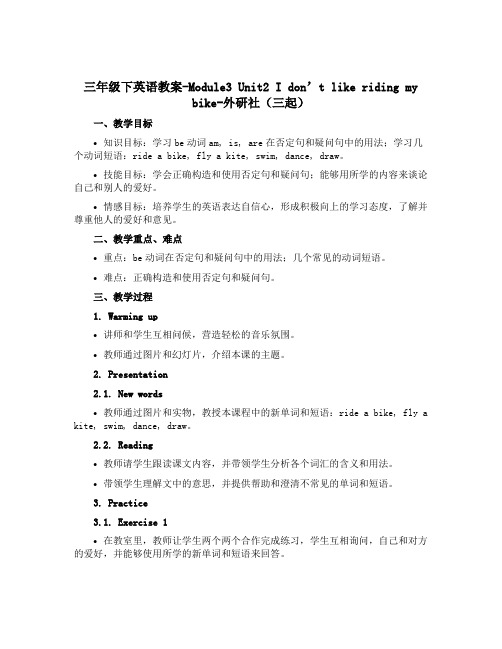
三年级下英语教案-Module3 Unit2 I don’t like riding mybike-外研社(三起)一、教学目标•知识目标:学习be动词am, is, are在否定句和疑问句中的用法;学习几个动词短语:ride a bike, fly a kite, swim, dance, draw。
•技能目标:学会正确构造和使用否定句和疑问句;能够用所学的内容来谈论自己和别人的爱好。
•情感目标:培养学生的英语表达自信心,形成积极向上的学习态度,了解并尊重他人的爱好和意见。
二、教学重点、难点•重点:be动词在否定句和疑问句中的用法;几个常见的动词短语。
•难点:正确构造和使用否定句和疑问句。
三、教学过程1. Warming up•讲师和学生互相问候,营造轻松的音乐氛围。
•教师通过图片和幻灯片,介绍本课的主题。
2. Presentation2.1. New words•教师通过图片和实物,教授本课程中的新单词和短语:ride a bike, fly a kite, swim, dance, draw。
2.2. Reading•教师请学生跟读课文内容,并带领学生分析各个词汇的含义和用法。
•带领学生理解文中的意思,并提供帮助和澄清不常见的单词和短语。
3. Practice3.1. Exercise 1•在教室里,教师让学生两个两个合作完成练习,学生互相询问,自己和对方的爱好,并能够使用所学的新单词和短语来回答。
•教师在此过程中仔细观察学生的表现,帮助他们检查和纠正错误的用法,并纠正他们的发音。
3.2. Exercise 2•教师让学生在小组内完成联系,在一个小组内互相交流,谈论自己和他人的爱好,并使用新学的单词和短语,教师在此过程中进行指导和帮助。
4. Production•教师提供一些话题,让学生使用所学的知识,自由发挥来表达自己的观点。
•学生使用自己的语言表达自己的观点,并完成一些书面作业,以检查所学知识的掌握情况。
三年级下册英语说课稿-Module 3 Unit2 I don’t like riding my b

三年级下册英语说课稿-Module 3 Unit2 I don’t like ridingmy bikes.∣外研社(三起)一、教材分析Module 3 Unit2 的主要教学内容为询问和回答喜欢或不喜欢做某些事情,如:I like swimming. Do you like swimming? No, I don’t like swimming. 本单元的重点句型是“I like swimming.” 和“I don’t like riding my bikes.”,同时这些句型都包含了“like”和“don’t like”,因此在教学中,需要重点讲解这两个词的用法,让学生明确其区别。
本单元的教学目标主要有:1.熟练掌握表达喜欢或不喜欢做某些事情的句型;2.能够听懂他人表达自己喜欢或不喜欢做某些事情,并能正确回答;3.能够用正确的语音、语调、语法、词汇表达自己喜欢或不喜欢做某些事情;4.提高学生的英语口语表达能力。
二、教学重点和难点教学重点:喜欢和不喜欢的句型及区别。
教学难点:发音和语音语调的运用。
三、教学策略与方法本单元的教学内容比较简单,但是对于学生的英语口语形成仍有很大的帮助,因此在教学过程中,我们应采用多种教学策略和方法,如以下几种:1.任务型教学法:在课堂上给学生制定任务,如用英语口头表达一些日常活动,并进行展示。
2.对比教学法:将“like”和“don’t like”进行对比,让学生明确其区别。
3.情景教学法:在课堂中创造逼真的情景,让学生置身其中,增加口语实践的机会。
四、教学过程设计1. 热身活动(5分钟)教师和学生使用英语问候并互相介绍自己的名字及感兴趣的事物,以达到热身效果。
2. 导入新知(10分钟)通过图片、视频或实物等不同的教学资源,让学生了解“like”和“don’t like”的表达以及这两个词的用法。
3. 讲解新知(15分钟)详细讲解“like”和“don’t like”的用法和区别,并结合实例进行说明。
外研版(三起)三下Module 3《Unit 2 I don’t like riding my bi
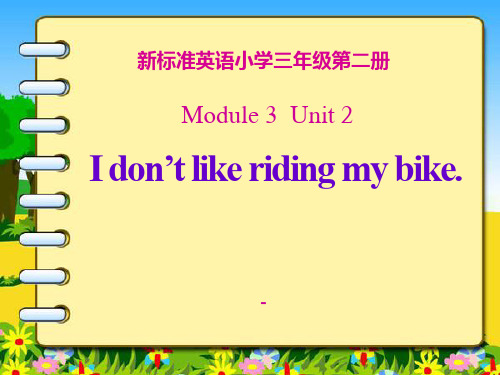
1.like/I/table tennis. I like table tennis. 2.exercises/I/don’t/like. I don’t like exercises. 3.like/riding/I/bikes.
I like riding bikes. 4.don’t/I/basketball/like. I don’t like basketball.
PPT背景:/beijing/
PPT图表:/tubiao/
PPT下载:/xiazai/
PPT教程: /powerpoint/
资料下载:/ziliao/
范文下载:/fanwen/
morning exercises football basketball table tennis
learn the new words(学习新单词)
swim
ride a bike
swimming riding a bike
skip
skipping
PPT模板:/moban/
PPT素材:/sucai/
Play a game
• Act and guess
• (一个同学上台表演运动的动作,其他同学 猜,看看谁的反应最快)
Point and say.
I don’t like football. I like morning exercises.
I don’t like basketball. I like table tennis. I like riding my bike. I don’t like swimming.
金2. I dont like football. 睛 (×) I don’t like football.
Module3Unit2Idon’tlikeridingmybike(课件)英语三年级下册(4)

Let’s sing again.
Like+动词ing
Do you know if Amy likes swimming? 你知道Amy是否喜欢游泳?
A.yes
B.no
Let’s watch.
Do you know if Amy likes swimming? 你知道Amy是否喜欢游泳?
课堂练习 一、连线题。
skip ride a bike swim
二、按要求写句子。
like/ swimming/ and/ I/skipping (.) (连词成句) _I _li_k_e_s_w__im__m_i_n_g__a_n_d_s_k_i_p_p_i_n_g_. __
I like riding a bike. (改为否定句) _D__o_y_o_u__li_k_e_r_i_d_in__g_a__b_ik_e_?_
外研版小学英语三年级下册
Module 3 Unit 2 I don't like riding my bike
Let’s play. 摘红旗
黄队和蓝队抢读单词并翻译,每抢对一个就上一级台阶,最先 摘得“红旗”的小组获胜。
tfbaomeabolxsliottekehbrretenacetmilibnnlsaneglils
ary
1.新词汇: ride bike swim skip
2. 句型: I like doing sth.
A.yes
B.no
Fill in the blanks.
根据图片动作和表情来填空。
1.
The girl likes _s_k_i_p_p_in__g_.
1.
I __l_ik_e_ swimming.
新标准大学英语2课本听力原文unit3
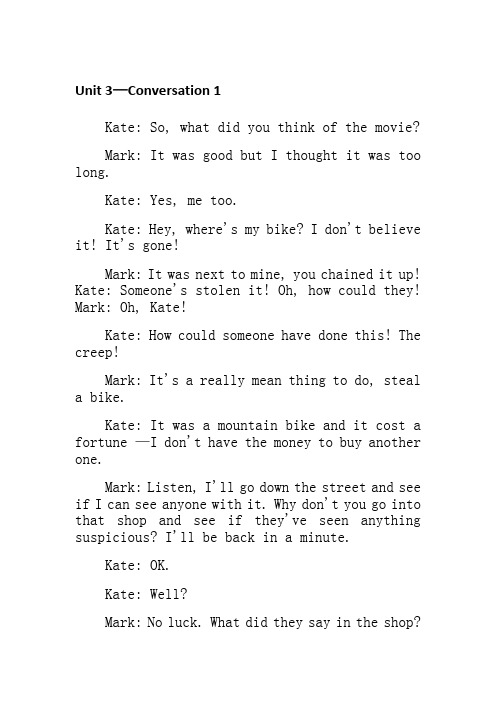
Unit 3—Conversation 1Kate: So, what did you think of the movie?Mark: It was good but I thought it was too long.Kate: Yes, me too.Kate: Hey, where's my bike? I don't believe it! It's gone!Mark: It was next to mine, you chained it up! Kate: Someone's stolen it! Oh, how could they! Mark: Oh, Kate!Kate: How could someone have done this! The creep!Mark: It's a really mean thing to do, steal a bike.Kate: It was a mountain bike and it cost a fortune —I don't have the money to buy another one.Mark: Listen, I'll go down the street and see if I can see anyone with it. Why don't you go into that shop and see if they've seen anything suspicious? I'll be back in a minute.Kate: OK.Kate: Well?Mark: No luck. What did they say in the shop?Kate: I asked the shopkeeper if she'd seen anything —Mark: And?Kate: She said she hadn't. I guess it was a long shot. She advised me to report it to the police. But according to her, bikes get stolen all the time around here.Mark: Listen, let's get back so you can report it.Kate: I've got no bike. I'm just so upset! Mark: It's not far to college. Come on!Unit 3--Conversation 2Mark: So did you ring the police?Kate: Yes. I went to the police station to report it.Mark: What did they say?Kate: No one's found it. This woman said that Oxford has the fifth highest rate of bike theft in the country!Mark: You're joking!Kate: That's what she said.Mark: What else did she say?Kate: She told me that sometimes you do get bikes back —the thieves use them and then abandon them, apparently, and then people find them and report them.Mark: So you might get it back.Kate: I hope so, Mark, I really do. It's just too much, you know? But ... um ... what else? She told me to go to this sale they have of abandoned bikes. She thinks I might find it there. But it's only every two months, I can't wait till then! Honestly, Mark, I'm really furious!Mark: You can always buy a cheap bike on eBay.Kate: Hello ... Speaking ... You found it! Where was it? Is it ...? Oh, that's fantastic news! There was a lamp and a basket on it ... Right ... OK, thank you, I'll be in tomorrow morning to pick it up. Unbelievable! This guy found it!Mark: Brilliant! Was that the police?Kate: Yes. What they said was, someone dumped it outside this guy's backyard.Mark: That's so strange!Kate: The lamp's been stolen and the basket.Mark: Forget about it! You're lucky to get it back!Unit 3-Outside viewPart 1Presenter Dodgy deals aren't the only problems associated with doorstep sellers. Your doorstep presents these unannounced visitors with a real opportunity to undertake distraction burglary where they often pose as bogus officials to gain access to your home. I'm joined now by Ian Holt, from Thames Valley Police. Ian, just outline for me what does distraction burglary actually entail?Ian Holt Well basically what happens is, somebody uses a5story to get inside somebody's house and then they steal items, usually cash or small items of jewellery.Presenter And what are the different techniques that are commonly used?Ian Holt Well basically they er ... the people that commit this crime move from area to area, er ... they will look at an area, they will try and pick a particular target and they can find that by looking at property, it may be er, an uncut garden, it may be repairs that need doing to the property. Something that indicates that there's a vulnerable person in there. Usually, it's an elderly person that lives there.Presenter Is this quite a common problem now?Ian Holt It is becoming more common. To get it in perspective, of the 14,000 burglaries that were in Thames Valley last year, we had reported 800 crimes of distraction burglary. But, it... there's a slight increase this year over last year's figures.Presenter OK, you mentioned some of the victims being elderly. What other people are targeted?Ian Holt Well, unfortunately, with this type of offence, it is the vulnerable in society and the elderly. The, the national average, if there's such a thing as a, a victim for this type of crime, is a white female aged 81 years. Part 2Presenter And what about things that people can do to prevent it happening, basically?Ian Holt Well the things they can do are very, very simple. The difficulty comes, is that some of these people, er ... it's very difficult for them to remember what to do. But the three things we, we always say is: stop, chain and check. And that's stop before you open the door to make sure who's on the other side. Always apply a chain. If you haven't got a chain, fit a chain to the door, or a door bar if you've got difficulty in handling a chain with arthritic fingers. But also when you answer the door, check the identity of the person there. Generally the offenders say they are fromthe Water Board or from utilities. They may say they're from a charity or even from local authority. But generally, a utility will be in uniform. Ask for their identification. A genuine person will not mind you doing that and will wait until you can check them out. If you do need to check them, phone the number on, on your last bill. What won't happen is that if it is a bogus caller, they will become unnerved by this reaction and they will leave. Presenter OK and there's also a couple of gadgets new on the market that also can help as well. Just talk us through that.Ian Holt Certainly, yes. The ... a spy er ... viewer is fairly standard. But for elderly who may have poor eyesight there's a spyscope which actually makes it a lot easier for them to see who's outside. As Imentioned before about the door bar, again, it can be easier to apply than the chain. Very reasonable priced er, and something that is fairly new ... as I mentioned before it's very difficult for some of these people to remember what they have to do when they go to the door and that's why they become victims. And this item is called a Memo Minder and actually you can record a message on there and it's nice to have agrand-daughter or somebody to record a message, but every time the person approaches the door it reminds them with a voice to say "Put your chain on."Unit 3-Listening inPassage 1Patrick; I read a funny story today in the paper - true story.Steve; Go on, then.Patrick; OK. This 72-year-old guy stole a pair of trousers from a department store in Paris.A security man saw him and alerted the police and they were waiting for him when he came out of the shop. The shoplifter started running, but the policeman soon caught up with him. The man then bit the policeman on his arm several times. ;Steve; He bit the policeman?Patrick; Yes - you have to remember, he was 72.Steve; I'd forgotten that.Patrick; Problem was, it didn't hurt the policeman at all, 'cause the guy had forgotten to put his false teeth in before he left home.Steve; Very funny!Patrick; And the moral of the story is -Steve; Always remember to wear your false teeth if you're going to bite someone.Patrick; That's good. I read a funny crime story the other day. Let's see ... yeah ... thisguy... this guy robbed a supermarket somewhere inAmerica -1 can't remember where exactly -anyway,he got away with about 4,000 dollars. The nextweek the local newspaper reported the story butsaid he'd stolen 6,000 dollars. The thief rang the newspaper office to complain. He said, "Look, Ionly took 4,000 dollars. I'm wondering if the supermarket manager took another 2,000 and saidI'd taken it. I did not take 6,000, I promise you." Steve; He was probably telling the truth.Patrick;He probably was. Anyway, the newspaper managed to keep the guy talking whilethey rang the police. And the police traced thecall - the guy was ringing from a phone booth -and they arrested him while he was still talkingto the newspaper.Steve; That's good. Stupid guy! I've gotanother true story ... This - this - old guy wasin court for some crime - and he fell asleep. Hiscase began and his lawyer stood up and said, "Myclient pleads not guilty." The man suddenly wokeup, but wasn't sure what was happening. He jumpedup and shouted, "I plead guilty! I plead guilty!"Patrick So what happened?Steve; The judge allowed him to plead notguilty. Patrick That's the best, I think.Passage 2Presenter; You're listening to Kevin Fallenand my topic for today is street crime. Beingmugged is something that can happen to anyone -and it's a very frightening experience. So it's positive when you hear of someone who was attacked by a mugger and defeated them - especially when that person is a woman. Anna Black was attacked by a mugger. She's here to tell us about it. How long ago did this happen, Anna?Anna;Just over a week ago. The day it happened,I was coming home from work a bit later than usual -1 think it was about seven. I was on my mobile phone, talking to my husband.Presenter; And it was still daylight?Anna; Yes. Anyway, suddenly, someone pulled my hair from behind - and at the same time they grabbed my mobile phone. Now, I'm a karate black belt –Presenter; Really!Anna; Yes, I practise three times a week - so I'm ready for situations like this.Presenter; I bet you are.Anna;Yes, I can react very fast. So as soon as this guy grabbed me, I did what you're told to do in these situations.Presenter; And what's that?Anna; I fell backwards onto him.Presenter; You fell backwards onto him!Anna; Yeah! I'm tall and quite heavy - so we both fell to the ground together.Presenter; Goodness!Anna; I er, yeah -1 was ready to hit him but then next thing I knew, two men had seized the guy. They were driving past and they, they stopped to help. They were big strong guys. They called the police who came in five minutes.Presenter; So the mugger was arrested?Anna; Yes, he was.Presenter;Do you think, if that hadn't happened, you could have injured him?Anna; Oh, I'd like to think so. I'm a black belt, that's what I'm trained to do.Presenter; Well, it's great to hear of women coping well in situations like this. Perhaps we should all learn karate.Anna; I think it's a good idea to have some kind of defence training. Yes, especially if you live in an area that isn't very safe.。
三年级新标准第二册英语第三四模块教案
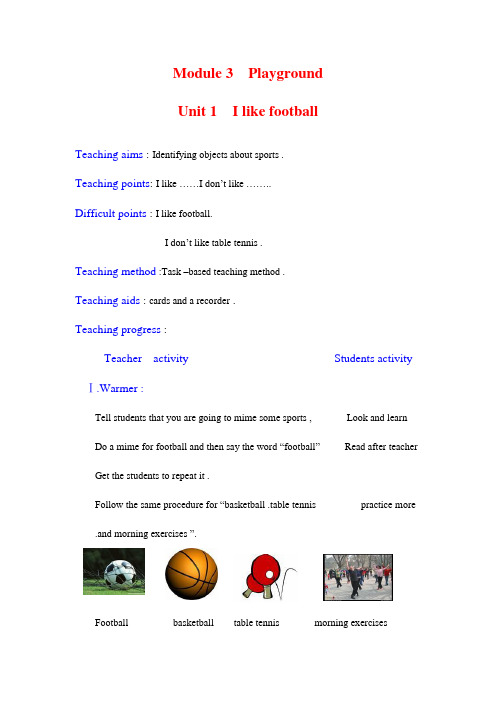
Module 3 PlaygroundUnit 1 I like footballTeaching aims : Identifying objects about sports .Teaching points: I like ……I don‟t like ……..Difficult points : I like football.I don‟t like table tennis .Teaching method :Task –based teaching method .Teaching aids : cards and a recorder .Teaching progress :Teacher activity Students activity Ⅰ.Warmer :Tell students that you are going to mime some sports , Look and learn Do a mime for football and then say the word “football”Read after teacher Get the students to repeat it .Follow the same procedure for “basketball .table tennis practice more .and morning exercises ”.Football basketball table tennis morning exercisesWrite all the new words on the board .Now do the mimes Look and say .again and see if the students can say the correct names .Ⅱ.Listen and point.Before doing “listen and point ”.have the students look at the pictures . Look anddescrible Ask them which sports they can see (football. basketball. table tennismorning exercises .)Get them to say the words in English .After listening to the tape .draw a happy face and a say face on Listen and point the board .Now point to the happy face smile and say .T:I like football. Look and learn to say . Point to the sad face .shake your head and say .T:I don‟t like basketball.Do more examples with table tennis and morning exercises . Practise one by one Ⅲ.Listen and say .Play the tape again ,pause after each uttern and get the Listen and repeat .students repeat .Ⅳ.Point and say .Tell the students to draw two pictures of sports on a Draw and say .piece of paper ,and tick “√”or“×”.eg:S1:(Point to the sport that tick “√”and say ). S1:I like ……I like ……I don‟t …….√I like….. ×I don‟t like…. ×I don‟t like …..(point to the sport that tick“×” ). Practise one by one Encourage students to personalize this activity .Ⅴ.Homework :Listen and read more after class .Unit 2 I don’t like riding bikesTeaching aims : Identifying objects about sports .Teaching points: I like swimming /skipping /riding bike.I don‟t like ……Difficult points : swimming /skipping /riding bike.Teaching method :Task –based teaching.Teaching aids : cards and a recorder .Teaching progress :Teacher activity Students activity Ⅰ.Warmer :Draw one happy and one sad face on separate pieces Look listen and say .of paper .Put them in different positions round theclassroom. Tell the students that you are going to callout the names of objects and sports .choose individualstudents to say if they like ……and point to the appropriate face .eg: T: Football. Work one by one .S1: (Points to the sad face ).I don‟t like football.S2: (Point to the happy face)I like football.Do a lot of examples .Ⅱ.Listen and point.Have the students look at the book .Ask them in Look and say . Chinese which sports they can see .(swimming .skipping. riding bikes ).Play the tape .students listen and point . Listen and repeat Play the tape again .but this time they have to follow the Listen and do .instructions .swimming skipping riding bikesNow tell the students that you are going to say the names ofsports and they have to do the mime .They may remember it work one by one . from the books .eg:T:swimmingSs: (mime swimming )Ⅲ.point and say .Hold up your book in the air and point to each Look and describe picture and ask students to identify them .Then ask individual students to read examples . work in pairs Have the students work in pairs .Ⅳ.Homework :Listen to the tape and read more after class .Module 4 FoodUnit 1 Do you like meat?Teaching aims:1)Learn the structure“Do you l ike …?2)Learn the new words: noodles, milk, meat, rice, fish ,pass”3)Learn the dialogue.Main point:1)Aims 1-3.Difficult points: Tom likes milk.Teaching aids: cards, tape, pictures.Teaching procedure:Step 1.Warming-up1)Greetings2)Sing the rhythm: I like coffee…….Step 2.PresentationSing the rhythm and write “coffee” and “tea” on the board, now you do an action of hungry, ask the Ss “ What do you like when you are hungry?” Explain that to the Ss.1)Show the following pictures to help the students learn the new words.2)Write the newwords on the blackboard: noodles,milk,rice, meat, fish.3)Teach the sound of the words.4)Practice the words.Put up the words on the wall and read them. First,teacher say English and let the students point to the relevant card, thenchange the roles. You can ask some Ss to be a teacher to read the words.5)T: There are five kinds food, do you like noodles? Milk? …….6)Now write the sentence pattern “Do you like……?” on the board.Do you like……? Yes, I do./ No, I don‟t.7)Practice the sentence pattern.T: Do you like milk, Wang Rong ?S1: Yes, I do.T: Do you like ……S2: ……Ask more Ss to practice.Step 3 New lessonT: There are so many things .I like noodles .Pass me the noodles, please.(Try to make one student pass the noodles card to the teacher.)1)Write the word “pass” and read it. Focus on the sound of “ass”. Let the students work in pairs .One sends orders and the other act.2)Now show the picture of the text, say “Look at the picture, who are theyin the picture?” Ss: Ms Smart, Lingling, Sam, Amy, Tom, Mr Smart. T:They are eating some things, yes? (Do an action of “eat”) Do you knowwhat they like? Now listen to the tape what they like.3)Play the tape for 2 times.4)Now have the Ss answer the questions one by one.e.g. T: What does Lingling like?S1: Meat.……5) Play the tape again, have the Ss repeat the sentences.6) Act the dialogue .At first, the teacher takes part in the roles.T: Pass me the rice, please.S1: Here you are, Ms Pan.T: Do you like meat, Xun Mingyu? (Hand a picture of meat)S2: Yes, I do.……Then ask more Ss to act the dialogue in the groups.At last, have them act in the class.Step 4.Practice1)Let the students read the dialogue in roles again.2)Talk about friends , what do they like.T: What do you like?S1: I like fish.S2: I like……3)Ask a row to practice.S1: What do you like?S2: I like rice. What do you like?S3: I like…4)Combine the “ Do you like …?” and “I like …”Do you like…?Yes, I do./ No, I don‟t. I like …5) Ask most Ss to practice the sentences.Step 5.Consolidation1) Now have the Ss close their books, listen to the dialogue and repeat .2) Help the students finish the exercises of the Activity Book.Step 6 Homework1)Listen to the tape.2)Try to act the dialogue.Unit 2 Does Daming like bananas ?Teaching aims:1)Learn the new structure: Does Daming like…?Yes, he does./ No, he doesn‟t.2)Learn the new words : banana(s), pear(s), orange(s), apple(s).3)Compare the two sentence pattern “Do you like…?”with “Does he/shelike…?”Main point:Aims 1-3.Difficult points: The difference of the two sentence patterns.Teaching aids: recorder, fruits or cardsTeaching procedure:Step 1.Warming-up1)Greetings2)Revision.Ask some students to act the dialogue of Unit1 in roles.Step 2.PresentationAt first, revise the words about food and the sentence pattern “Do you like…?”.The teacher asks some individuals to answer .T: Do you like noodles?S1: Yes, I do.T: You like noodles. Does Sam like noodles? ( The teacher pretends them to answer “Yes ,he does”) Then write them on the board.Continuing the sentence pattern.T: Does Lingling like meat?Ss: Yes, she does.T: Does Sam like noodles?Ss: Yes, he does.Step 3 New lesson1)Have the Ss look at the Unit1, you ask them some questions with thesentence pattern “Does …like…?”2)T: Does Tom like milk?Ss: Yes, he does.T: Yes, Tom likes milk.3)Explain the two sentence tatterns.Do you like …? Does he /she like…?Yes, I do. Yes, he/she does.No, I don‟t. No, he/ she doesn‟t.4)Now show some pictures.Bananas, pears, oranges, apples(Focus on the pronunciations of …s‟)5)Practice the new words in a same way of Unit1.6)Practice the words with the sentence pattern “ Do you like …?”T: Do you like bananas?S1: Yes, I do.T: Does S1 like bananas?S2: Yes, he does.……7)Now tell the Ss that you will play the tape, they will listen to Daming andLingling, they will say what they like and what they don‟t like.8)Listen to the tape and answer questions.Does Daming like bananas?Yes, he does. Daming likes bananasDo Lingling like oranges?Yes, she does. Lingling likes oranges……Step 4.Practice1) Play the tape again, and repeat the sentences.2) Ask the students to ask and answer the dialogue in pairs.3) Learn the words: ginger, spice.4) Put up the food and the fruit on the board ,practice the sentence patterns“ Do you like…?” and “Does…like…?”, like Activity3, three students are apair.5) A guessing game.A student stands in the front, the second one asks “ Does … like apples?”The other Ss guess , “ Yes, he does / No , he doesn‟t”.Step 5.Consolidation1)Point to the things or cards, then ask and answer.A: Does Daming like bananasB:Yes, he does./No, he doesn‟t.2)Listen to the rhythm of Activity4, follow it and read it.3)Listen to the Activity6, follow it the letters and the words.4) Help the students finish the exercises of the Activity Book.Step 6 Homework1`)Let the students listen to the tape at home.2)Talk about them and their friends with “Do you like…?”“Does he/shelike…?”。
Module 3 Unit 2 I don’t like riding my bike(说课稿)外研
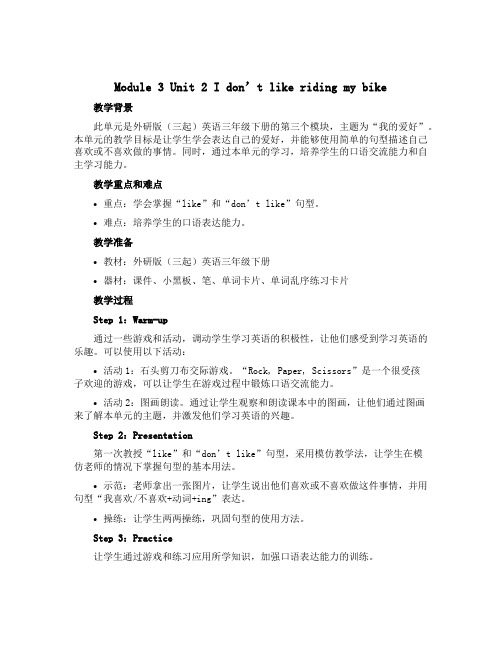
Module 3 Unit 2 I don’t like riding my bike教学背景此单元是外研版(三起)英语三年级下册的第三个模块,主题为“我的爱好”。
本单元的教学目标是让学生学会表达自己的爱好,并能够使用简单的句型描述自己喜欢或不喜欢做的事情。
同时,通过本单元的学习,培养学生的口语交流能力和自主学习能力。
教学重点和难点•重点:学会掌握“like”和“don’t like”句型。
•难点:培养学生的口语表达能力。
教学准备•教材:外研版(三起)英语三年级下册•器材:课件、小黑板、笔、单词卡片、单词乱序练习卡片教学过程Step 1:Warm-up通过一些游戏和活动,调动学生学习英语的积极性,让他们感受到学习英语的乐趣。
可以使用以下活动:•活动1:石头剪刀布交际游戏。
“Rock, Paper, Scissors”是一个很受孩子欢迎的游戏,可以让学生在游戏过程中锻炼口语交流能力。
•活动2:图画朗读。
通过让学生观察和朗读课本中的图画,让他们通过图画来了解本单元的主题,并激发他们学习英语的兴趣。
Step 2:Presentation第一次教授“like”和“don’t like”句型,采用模仿教学法,让学生在模仿老师的情况下掌握句型的基本用法。
•示范:老师拿出一张图片,让学生说出他们喜欢或不喜欢做这件事情,并用句型“我喜欢/不喜欢+动词+ing”表达。
•操练:让学生两两操练,巩固句型的使用方法。
Step 3:Practice让学生通过游戏和练习应用所学知识,加强口语表达能力的训练。
•游戏1:找朋友。
老师发放单词卡片,让学生在教室内找到对应单词的同学,并句型描述他们的喜好或不喜好。
•游戏2:单词乱序。
老师将本单元所学的单词分别写在不同的卡片上,然后将卡片打乱顺序给学生,让他们在时间限制内排列出单词,巩固所学的词汇。
Step 4:Production让学生自己动手表达自己的喜好或不喜好,并与同学分享。
三年级英语下册教学设计-Module 3 Unit 2 I don't like riding my

三年级英语下册教学设计-Module 3 Unit 2 I don’t like riding my bike.(7)-外研版(三起)教学目标1.学会使用单词bike, train, skateboard, roller-skates, scooter, bus, car, walking等交通工具的名称,并能准确发音和拼写。
2.掌握并使用句型“I like/ don’t like…”来表达自己喜欢或不喜欢的交通方式,并能流利使用句型进行口语表达。
3.鼓励学生主动参与语言交流和表达,增强其英语口语能力。
教学重点1.学会交通工具名称的发音和拼写。
2.掌握并使用句型“I like/ don’t like…”进行口语表达。
教学难点如何鼓励学生主动参与语言交流和表达。
教学准备1.PPT课件。
2.交通工具图片。
3.教学视频。
4.相关教学材料。
教学过程Step 1 自主探究交通工具名称1.让学生看PPT,根据图片学习交通工具名称并尝试发音。
2.让学生分组,互相合作检查单词发音。
3.教师巡回辅导,关注学生发音是否准确。
Step 2 熟悉交通工具名称1.让学生听听力,听听发音是否准确并能理解单词意思。
2.观看教学视频,熟悉交通工具名称并尝试模仿视频中的读音和语音语调。
Step 3 模仿句型1.呈现“I like…”“I don’t like…”等句型,向学生介绍其基本构成和用法。
2.带领学生进行模仿、表演并动手练习。
Step 4 互动交流1.呈现交通工具图片,让学生使用“I like/ don’t like…”句型来表达自己的喜好。
2.分组讨论,学生能进行英语口语对话,进行互动交流。
Step 5 课堂测试1.收集学生最终输出的交通工具名称,给予评价和鼓励。
2.基于所学知识进行小组测试,鼓励学生进行积极参与,巩固所学内容。
教学评价在教学过程中,重点注意对学生口语和发音的指导和纠正。
教学设计旨在创造积极互动的学习环境,鼓励学生主动参与,积极表达,增强其英语口语能力。
- 1、下载文档前请自行甄别文档内容的完整性,平台不提供额外的编辑、内容补充、找答案等附加服务。
- 2、"仅部分预览"的文档,不可在线预览部分如存在完整性等问题,可反馈申请退款(可完整预览的文档不适用该条件!)。
- 3、如文档侵犯您的权益,请联系客服反馈,我们会尽快为您处理(人工客服工作时间:9:00-18:30)。
Module 3 Unit 2
I don’t like riding my bike.
Let’s say a chant.
Football , football, I like football.
Basketball, basketball, I like basketball.
串珠成链
Follow and say
coffee
tea
candy
cat
tiger
elephant
monkey
lion
dog
orange
banana
apple
Homework:Make a survey(调查)
Sport
name
I like riding my bike. I don’t like swimming.
Chant
I like coffee. I like tea. I like cats and they like me. I like coffee I like tea. I don’t like lions and they don’t like me.
(×) I like table tennis.
1.like/I/table tennis. I like table tennis. 2.exercises/I/don’t/like. I don’t like exercises. 3.like/riding/I/bikes. I like riding bikes. 4.don’t/I/basketball/like. I don’t like basketball.
Table tennis, table tennis, I don’t like table tennis.
Morning exercises, morning exercises, I don’t like morning exercises.
Review the words(复习单词)
I like… I don’t like…
football morning exercises basketball table tennis
learn the new words(学习新单词)
swim swimming skip
ride a bike riding a bike skipping
I like swim ming.
I don’t like swimming.
Play a game
• Act and guess • (一个同学上台表演运动的动作,其他同学 猜,看看谁的反应最快)
Point and say.
I don’t likeercises.
I don’t like basketball. I like table tennis.
Retell the text by yourself.
(自我复述课文)
I like swimming.
They like swimming. He likes swimming.
知识拓展
Sing a song
• I like swimming ,I like skipping, I like Lingling skipping with me . • I like skipping ,I like swimming, I like Lingling riding bikes with me .
learn the new text(学习新课文)
I like swimming. I don’t like skipping.
learn the new text(学习新课文)
I like skipping.
I don’t like rid ing my bike . ride
learn the new text(学习新课文)
火 1. I like swim. 眼 (×) I like swimming. 金 2. I dont like football. 睛 (×) I don’t like football. 辨 3. I like morning exercise. ( × ) I like morning exercises . 对 错 4. I like table tenis.
